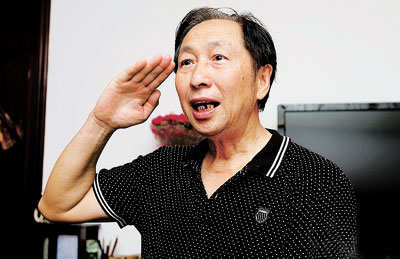
Lai Junyu, Wang Yuanyuan
cheekywang@hotmail.com
WELL-KNOWN Shenzhen lyricist Jiang Kairu was once again in the national spotlight after the music video for a made-in-Shenzhen festival song was played on the big screen in Times Square, New York City, two weeks ago.
It was the first time for a Chinese song to be aired on the big screen in Times Square. The global exposure has become one of the hottest issues in China — but not for Jiang.
“I think this is very normal and is something we should do. I don’t have much special feeling about its big success. I’m just very calm,” Jiang, 78, said to Shenzhen Daily on Monday.
As a descendant of a Kuomintang family, Jiang gave up going to Taiwan with his family in 1949. Although he had a hard life when he was young, he said he often feels calm and grateful these days.
“I have an antenna to receive happiness. For example, I did not go to Hong Kong with my sister because I appreciated the sense of happiness in hard times. For me, eating porridge with friends around a small table is much happier than having big dinners in a fancy restaurant. I want more people to learn to cherish this sense of happiness,” he said.
Writing ‘Chinese
Festivals’
Jiang wrote the song for a six-part micro-movie produced by Farming Culture, a culture company in Shenzhen.
“Lu Xinggen, the boss of the company, invited me to write the lyrics for a song that would introduce the six traditional Chinese festivals in the micro-movie,” Jiang said. “I thought it was a great thing for Lu to do. It was a warning for all Chinese people that our Dragon Boat Festival had been approved as intangible cultural heritage for other countries. Chinese people should protect their own cultural rights, so I said ‘yes’ immediately. I just wrote lyrics when I was moved.”
In Jiang’s opinion, Chinese festivals are cultural extensions of the Chinese spirit and are days when people connect with nature, so he wrote: “Rain for the Qingming Festival, snow for the Lantern Festival, wind for the Double Ninth Festival, moonlight for Mid-Autumn Days, family reunions for Spring Festival and good spirits for Dragon Boat Festival.”
Jiang said he wrote the song with “a child’s heart.”
“Because the festivals move the gods, there is special weather for every festival,” he said.
When Lu brought the lyrics to Beijing on July 2 last year, they were highly praised by his media friends, so he found well-known composer Liu Qing and asked him to compose the song.
“I had worked with Liu several times before. He had a very good understanding of the song. Eventually we decided to choose Liu Ziqi because we thought a mezzo-soprano’s voice could make the song easier to sing for everyone,” Jiang said.
A successful amateur
A Guangxi Zhuang Autonomous Region native born in 1935, Jiang has never seen himself as a professional song writer.
“I like writing poems and diaries. They were just some personal hobbies, but I did not realize that all these poems and diaries were actually lyrics until I was 44,” Jiang said.
The nonprofessional lyricist wrote two of the best-known songs for Shenzhen’s achievements and China’s reform and opening up — “The Story of Spring” and “Into a New Era” — and Jiang then became one of the best-known writers of revolutionary songs.
Because of his great success, people sometimes questioned Jiang about his “political songs,” but Jiang said he took it peacefully.
“I wrote songs not because I wanted to butter somebody up. These songs were my understanding of life and people. They were the same as the country’s development or attitudes because our wills were the same as our country’s,” he said.
Positive energy
Some say Jiang’s songs often pass on positive energy to audiences, but Jiang hasn’t agreed with that, either.
“I did not intend to write songs with positive energy and I don’t want to be labeled as a lyricist with positive energy,” Jiang said. “All of my songs were written from my heart and I just tried to express my gratitude and feelings.”
Jiang said when he writes a song, he only thinks about two things — whether it would move his heart and whether it would be accepted by the public.
“If you want to write a song which is widely accepted by the public, you must know what people need now very well,” he said. “For example, when I wrote ‘Chinese Festivals,’ I thought that the economy and politics were not enough for solving modern social problems. People need spiritual power as well, and I thought that the world also needs our ‘Chinese spirit’ of connecting people and nature. It was a harmonious relationship between humans and nature, society as well as hearts. If one has the harmonious relationship, he will naturally love his home, his country and his nation.”
“I wrote songs not because I wanted to butter somebody up. These songs were my understanding of life and people. They were the same as the country’s development or attitudes because our wills were the same as our country’s.”
— Jiang Kairu
|

